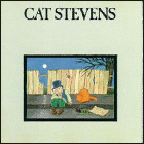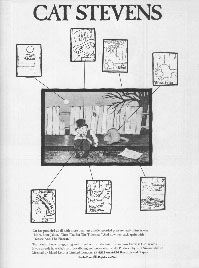![]()
  |

Teaser and the Firecat
Cat Stevens
A&M 4313
Released: October 1971
Chart Peak: #2
Weeks Charted: 67
Certified Gold: 10/18/71
"I get the tune and then I just keep on singing the tune until the words come out from the tune. It's kind of a hypnotic state that you reach after a while when you keep on playing it where words just evolve from it. So you take those words and just let them go whichever way they want... 'Moonshadow'? Funny, that was in Spain, I went there alone, completely alone, to get away from a few things. And I was dancin' on the rocks there... right on the rocks where the waves were like blowin' and splashin'. Really, it was so fantastic. And the moon was bright, ya know, and I started dancin' and singin' and I sang that song and it stayed. It's just the kind of moment that you want to find when you're writin' songs." -- Cat Stevens to a Boston DJ
 The immediate virtues of Teaser and the Firecat have become pretty self-evident: it has already yielded three hit singles. Two of these hits are infectious but basically dreck, and I think their success can be attributed mainly to production coups. "Rubylove" has a pleasant enough tune, but it's the novelty of those two Zorbas on the bouzoukis that makes the song. "Peace Train" has a healthy dose of Cat's characteristic calypso funk, but what puts you through the windshield those first few times is all that handclapping and bass drum pedal.
The immediate virtues of Teaser and the Firecat have become pretty self-evident: it has already yielded three hit singles. Two of these hits are infectious but basically dreck, and I think their success can be attributed mainly to production coups. "Rubylove" has a pleasant enough tune, but it's the novelty of those two Zorbas on the bouzoukis that makes the song. "Peace Train" has a healthy dose of Cat's characteristic calypso funk, but what puts you through the windshield those first few times is all that handclapping and bass drum pedal.
 Click image for larger view. |
In one of his new songs, Cat defines his songwriting method in highly romantic but entirely plausible terms: "I listen to the wind of my soul." Many of his lyrics seem to go straight from his subconscious and into the listener's, completely by-passing the intellect. Even in his early pop star days, many of Cat's short, crude hit songs had the sound of weather reports from the subconscious. Not having developed much artistry or control, he sometimes let his thoughts escape in raw pathological form, set to absurdly inappropriate little pop melodies. For instance, "I'm Gonna Get Me a Gun," with it's never-to-be-sufficient refrain of "I'm gonna get me a gun,/ And all those people who put me down,/ better get ready to run."
Then came his TB cure and two years of searching for satori. By the time he wrote Mona Bone Jakon, he was capable of achieving a synthesis of self-consciousness and sub-consciousness.
When his girlfriend, who happened to be named D'Arbanville, left him for Mick Jagger, he wrote "Lady D'Arbanville." The melody (consciously or not) was very similar to Jagger's "Lady Jane." In the lyrics, Cat effectively laid Miss D'Arbanville to rest: "Tho' in your grave you lie, I'll always be with you," etc., etc. Cat had transmitted his unseemly feelings into a courtly and mysterious ballad that was a hit in six countries. Courtly and mysterious and so gentle-sounding it makes your flesh creep.
At any rate, I prefer those of Cat's songs that sound as if they had bubbled up from the back of his mind. The more thought-out ones tend to reveal the working of a staggeringly banal intellect. Cat's political visions indicates a less than nodding acquaintance with current events. "Peace Train" at least delivers its simple-minded message in an appropriately childish tone. "I've been happy lately" thinking about the possibilities of the future; "I've been crying lately thinking about the world as it is." That simple. In "Changes IV" however, Cat attempts a full-blown statement of his world view and succeeds like sounding like the Knute Rockne of the Age of Aquarius: "And we all know it's better/ Yesterday has past/Now let's all start living/ For the one that's going to last." Musically, the song is almost a parody of Cat's flashiest and cheapest tricks, of his tendency to overdramatize a tune with rubato and heavy dynamics. An absurd flamenco guitar flourish keeps popping up as Cat heralds the new day when "the people of the world/ Can all live in one room." I know he means something nice by that, but taken at face value it sounds like a proposal for universal genocide.
The only lyric on the album that makes a really sophisticated, coherent statement about the world is "Morning Has Broken." As Cat announces at his concerts, "Morning Has Broken" was a "hit hymn" of the Victorian Age. It is a gorgeous hymn, offering God respect and gratitude in suitably sentimental formal language. It has a grandeur of of diction which no contemporary song can match. The hymn is absolutely right for Cat; it expresses his optimism, his reverence, his sentimentality more fluently than he himself can. He sings it about as well as it can be sung and gives it a dignified piano/guitar/muted chorus arrangement that is perfect.
Cat's finest songs seem to spring from self-examination, from his search for a personal ethic; his inner voice speaks with a complexity and a conviction that his strictly self-conscious efforts lack. The three most interesting songs on Teaser -- "Tuesday's Dead," the most spectacular number on the record, consists of a manic tumble of words ending with the chorus: "Whoa, where do you go when you don't want no one to know/Who-oo told tomorrow Tuesday's dead?" I have no idea what the chorus means and neither, as far as I know, does Cat. On stage, he prefaces the song with some mumbled remarks about New York hotels being weird and having to tip people and getting caught up in life's trivia. As a whole, however, the song manages to convey Cat's determination to hammer out a working set of values -- the same idea expressed in "On the Road to Find Out." The language of the chorus -- that combination of words -- is gripping, no matter what it means. The music -- the irresistible calypso tune, the delayed entrance of the second guitar, the exclamatory punch of the bass pedal, the classic Jamaican choral work -- is Cat at his flamboyant best.
The other two songs are quiet and peaceful. Both songs use bizarre and Zen-like images to express a resignation to fate and a simple faith in the future -- very different from the mindless, cheerleading optimism of "Peace Train." The moonshadow is a purifying light that will comfort Cat even in the most terrifying physical trials he can imagine -- blindness, dumbness and mutilation. Patient meditation has finally brought him peace, hopefully a lasting peace: "Did it take long to find me/ I ask the faithful light/ Did it take long to find me/ And are you going to stay the night?" That is a very satisfying lyric, one that works perfectly on both the real and metaphysical levels. The child-like, traditional-sounding tune fits the words to a T. The guitar accompaniment by Cat and Alun Davies, and the hint of tambourine, are just right.
"The Wind" is a model of economical songwriting, a far cry from the early pop songs in which Cat endlessly repeated the same trivial verse, padding it out with meaningless breaks. In less than two minutes, "The Wind" compresses Cat's philosophy and a description of his working methods into a few mysterious images. The language is beautifully controlled, the melody is exquisite, the vocal is soulfully phrased, and the two guitars play in elegant counterpoint. A gem.
Cat has become a dependable artist, a good artist, but he appears to be one of those composers who does not develop, who holds no surprises. Given his three albums to listen to for the first time, one would be hard put to place them in chronological order. They all contain the same themes, same instrumental texture, and the same sensibility. He has an unmistakable style, a unique ability to combine sophisticated, commercial melodies with personal, almost primitive lyrics. As that style is currently big on the market, there is no urgent pressure for him to change it. One would like to see him develop the polished lyrics of a James Taylor or the deep resonance of a Van Morrison... But enough carping. His songs, though they may be small pleasures when they come on the FM radio, are cause for celebration when they come on the AM. That's enough to ask of Cat for now.
- Timothy Crouse, Rolling Stone, 12/9/71.
Bonus Reviews!
"Peace Train" and "Moon Shadow" are already all over the AM airwaves, and the FM stations are playing the rest of the album. Happily, Stevens is as successful artistically as he is commercially, and this album is as lovely as "Tea for the Tillermen." The tour de force is "Ruby Love," in 7/4 time, with the chorus in Greek.
- Billboard, 1971.
The followup to Tea for the Tillerman was almost as impressive. Sonically, less energy was put into creating empty real soundscapes, with more emphasis on tighter song constructions and immediacy. The result paid off with three international hits, "Peace Train," "Moonshadow," and "Morning Has Broken." Other highlights included "Tuesday's Dead," "The Wind," "Bitter Blue," and "Ruby Love." After Tea for the Tillerman, this is the one to get. * * * *
- Rick Clark, The All-Music Guide to Rock, 1995.
Teaser and the Firecat is almost as good as Tea for the Tillerman, particularly the (then) side two combination of "Morning Has Broken," "Bitterblue," "Moonshadow" and "Peace Train." * * * * 1/2
- Lawrence Gabriel, Musichound Rock: The Essential Album Guide, 1996.
Pop music was never far from Cat Stevens' creative soul and Teaser And The Firecat is as good an example of what the singer/songwriter was trying to achieve in this area. Produced by Paul Samwell-Smith the album blended a variety of styles -- earnest ballads; up-tempo songs; light but far from frothy pop numbers; traditional hymns -- and it consolidated Stevens' standing on both sides of the Atlantic and complements his earlier album Tea For The Tillerman, with its search for meaning in relationships and for life's purposes.
The album spawned two hit singles in the form of "Moonshadow" -- which although only managing Number 22 and Number 30 in the UK and US respectively has etched itself onto listeners' consciousness to the extent that it feels almost like the iconic Stevens' track. His adaptation of the traditional English hymn, "Morning Has Broken" featured Yes keyboardist Rick Wakeman; it charted at Number Nine in the UK and Six in the US. His call for a peaceful world in "Peace Train" continues a regular theme of his, namely a call for peoples of the world to come together and eschew war and conflict.
The album itself proved to be Stevens' then-most successful to date, reaching Number Three in the UK and narrowly missing out of a US chart-topper, managing Number Two.
As of 2004, Tea For The Tillerman was the #87 best-selling album of the 70s.
- Hamish Champ, The 100 Best-Selling Albums of the 70s, 2004.
![]() Reader's Comments
Reader's Comments
No comments so far, be the first to comment.